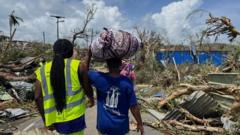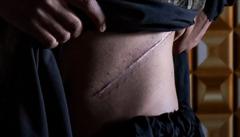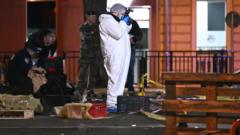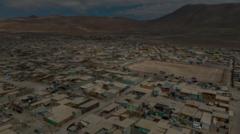Residents of Mayotte are grappling with the devastation left in the wake of Cyclone Chido, labeled the worst storm in nearly a century, which struck the French territory with winds exceeding 225 km/h (140 mph). Survivors describe scenes reminiscent of a post-apocalyptic landscape as entire neighborhoods were obliterated.
Cyclone Chido Leaves Mayotte in Ruins: Residents Describe Catastrophic Impact

Cyclone Chido Leaves Mayotte in Ruins: Residents Describe Catastrophic Impact
As rescue efforts intensify in Mayotte, residents recount the harrowing aftermath of Cyclone Chido, which unleashed unprecedented destruction on the island.
"Our situation is dire," stated a Mamoudzou resident. "We’ve been without water for days, and many of my neighbors are suffering from hunger and thirst." As the national government promises aid, French President Emmanuel Macron announced his impending visit to offer support to emergency services and residents alike.
Emergency crews, bolstered by reinforcements from France, are sifting through the wreckage in search of survivors. Although the initial confirmed death toll stands at twenty, local authorities warn that the total could swell into the hundreds, perhaps even thousands, as assessments continue, particularly among undocumented migrants in the heavily affected areas.
Rescuers face significant challenges with shattered infrastructure, including downed power lines and debris-choked roads, complicating relief efforts. Despite the arrival of supplies, critical shortages in food, water, and shelter exacerbate the already severe conditions faced by the inhabitants of Mayotte, where approximately 85% are without power.
Amalia Mazon, a midwife from Brussels, expressed frustration, stating, "The available water is yellow and unusable. We feel abandoned, unsure if help will arrive." Acting French Health Minister Geneviève Darrieussecq recognized the disaster’s impact, revealing that the cyclone has severely compromised the healthcare system in the region.
Once a French colony, Mayotte now relies heavily on financial aid from France, struggling under the weight of poverty and high unemployment rates. Approximately 75% of its population lives under the poverty line, a fact that intensifies the crisis after such devastating damage.
Amidst the destruction, John Balloz, a local resident, reflected on his survival, adding, "Nearly everything is destroyed, including the water treatment facility. There’s so much to rebuild." As concerns about hunger rise, Senator Salama Ramia expressed alarm for those going without food since the cyclone's onset.
Authorities are evaluating the full extent of the disaster, with some estimates suggesting the death toll may exceed several hundred. With many of the most vulnerable communities hit hardest, the challenging task of documenting casualties is compounded by the Muslim tradition of rapid burial.
As humanitarian efforts accelerate, a contingent of French troops, numbering over 200, are set to assist in the rescue and recovery operations. French Interior Minister Bruno Retailleau acknowledged the extent of the damage, stating, "It will take days to properly assess the human costs of this calamity."
The French Red Cross described the situation as chaotic, with rescuers only managing to reach a fraction of their volunteers on the ground. Amid fears of rising death tolls, they highlighted the total destruction of slum areas, with reports of displaced persons still unreported.
Cyclone Chido's destructive force was also felt in Mozambique, where it caused flooding, uprooted trees, and damaged infrastructure. Reports indicate three fatalities there, prompted by the storm's swift movement across land.
As recovery efforts continue, experts warn of the growing impact of climate change on storm intensity, which could lead to more frequent and devastating cyclones in the future. The storm has since weakened to a depression but poses ongoing risks of heavy rainfall as it moves inland.
In light of the unfolding crisis, awareness and support remain crucial for Mayotte's recovery as the community attempts to heal from this unprecedented disaster.
Emergency crews, bolstered by reinforcements from France, are sifting through the wreckage in search of survivors. Although the initial confirmed death toll stands at twenty, local authorities warn that the total could swell into the hundreds, perhaps even thousands, as assessments continue, particularly among undocumented migrants in the heavily affected areas.
Rescuers face significant challenges with shattered infrastructure, including downed power lines and debris-choked roads, complicating relief efforts. Despite the arrival of supplies, critical shortages in food, water, and shelter exacerbate the already severe conditions faced by the inhabitants of Mayotte, where approximately 85% are without power.
Amalia Mazon, a midwife from Brussels, expressed frustration, stating, "The available water is yellow and unusable. We feel abandoned, unsure if help will arrive." Acting French Health Minister Geneviève Darrieussecq recognized the disaster’s impact, revealing that the cyclone has severely compromised the healthcare system in the region.
Once a French colony, Mayotte now relies heavily on financial aid from France, struggling under the weight of poverty and high unemployment rates. Approximately 75% of its population lives under the poverty line, a fact that intensifies the crisis after such devastating damage.
Amidst the destruction, John Balloz, a local resident, reflected on his survival, adding, "Nearly everything is destroyed, including the water treatment facility. There’s so much to rebuild." As concerns about hunger rise, Senator Salama Ramia expressed alarm for those going without food since the cyclone's onset.
Authorities are evaluating the full extent of the disaster, with some estimates suggesting the death toll may exceed several hundred. With many of the most vulnerable communities hit hardest, the challenging task of documenting casualties is compounded by the Muslim tradition of rapid burial.
As humanitarian efforts accelerate, a contingent of French troops, numbering over 200, are set to assist in the rescue and recovery operations. French Interior Minister Bruno Retailleau acknowledged the extent of the damage, stating, "It will take days to properly assess the human costs of this calamity."
The French Red Cross described the situation as chaotic, with rescuers only managing to reach a fraction of their volunteers on the ground. Amid fears of rising death tolls, they highlighted the total destruction of slum areas, with reports of displaced persons still unreported.
Cyclone Chido's destructive force was also felt in Mozambique, where it caused flooding, uprooted trees, and damaged infrastructure. Reports indicate three fatalities there, prompted by the storm's swift movement across land.
As recovery efforts continue, experts warn of the growing impact of climate change on storm intensity, which could lead to more frequent and devastating cyclones in the future. The storm has since weakened to a depression but poses ongoing risks of heavy rainfall as it moves inland.
In light of the unfolding crisis, awareness and support remain crucial for Mayotte's recovery as the community attempts to heal from this unprecedented disaster.



















